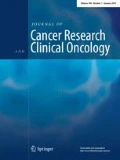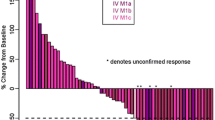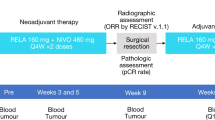Abstract
Purpose
To assess the efficacy and tolerability of extended dose temozolomide and continuous thalidomide in patients with advanced metastatic cutaneous melanoma.
Patients and methods
Eligibility criteria included adults with histologic diagnosis of metastatic melanoma with adequate organ function and performance status. Temozolomide (75 mg/m2/day) was administered for 6 weeks followed by a 2-week rest. Thalidomide (200 mg/day) was given for the first 2 weeks and increased by 100 mg/day at weekly intervals up to a maximum of 400 mg/day, if no toxicity. For patients older than 70 years, thalidomide was started at 100 mg/day and the dose was increased by 50 mg/day up to a maximum of 250 mg/day.
Results
Twenty-six extensively pretreated subjects, with poor prognostic factors, were entered into this study and included in all analyses. According to the RECIST criteria, one (4%) subject achieved a complete response (CR), two (8%) partial response (PR), and five (19%) stable disease (SD), for a response rate (CR + PR) of 12% [95% confidence interval (CI), 0–24.7%] and a clinical benefit (CR + PR + SD) of 31%. Median time to progression was 1.8 months (95% CI, 1.2–2.4 months) and median survival was 5.2 months (95% CI, 4.1–6.2 months).
Conclusions
The combination of temozolomide and thalidomide is well tolerated in patients with very advanced heavily pretreated metastatic melanoma. It has modest activity in this population with grave prognosis.


Similar content being viewed by others
References
Agarwala SS, Kirkwood JM, Gore M, et al (2004) Temozolomide for the treatment of brain metastases associated with metastatic melanoma: a phase II study. J Clin Oncol 22:2101–2107
Amer MH, Al-Sarraf M, Baker LH, Vaitkevicius VK (1978) Malignant melanoma and central nervous system metastases: incidence, diagnosis, treatment and survival. Cancer 42:660–668
Atkins MB, Kunkel L, Sznol M, Rosenberg SA (2000) High-dose recombinant interleukin-2 therapy in patients with metastatic melanoma: long-term survival update. Cancer J Sci Am 6(Suppl. 1):S11–S14
Bafaloukos D, Gogas H, Georgoulias V, et al (2002) Temozolomide in combination with docetaxel in patients with advanced melanoma: a phase II study of the hellenic co-operative oncology group. J Clin Oncol 20:420–425
Balch CM, Soong SJ, Atkins MB, et al (2004) An evidence-based staging system for cutaneous melanoma. CA Cancer J Clin 54:131–149
Barth A, Wanek LA, Morton DL (1995) Prognostic factors in 1,521 melanoma patients with distant metastases. J Am Coll Surg 181:193–201
Buzaid AC, Ross MI, Balch CM, et al (1997) Critical analysis of the current American joint committee on cancer staging system for cutaneous melanoma and proposal of a new staging system. J Clin Oncol 15:1039–1051
Chapman PB, Einhorn LH, Meyers ML, et al (1999) Phase III multicenter randomized trial of the Dartmouth regimen versus dacarbazine in patients with metastatic melanoma. J Clin Oncol 17:2745–2751
Danson S, Lorigan P, Arance A, et al (2003) Randomized phase II study of temozolomide given every 8 hours or daily with either interferon alfa-2b or thalidomide in metastatic malignant melanoma. J Clin Oncol 21:2551–2557
Huncharek M, Caubet JF, McGarry R (2001) Single-agent DTIC versus combination chemotherapy with or without immunotherapy in metastatic melanoma: a meta-analysis of 3,273 patients from 20 randomized trials. Melanoma Res 11:75–81
Hwu WJ, Krown SE, Panageas KS, et al (2002) Temozolomide plus thalidomide in patients with advanced melanoma: results of a dose-finding trial. J Clin Oncol 20:2610–2615
Hwu WJ, Krown SE, Menell JH, et al (2003) Phase II study of temozolomide plus thalidomide for the treatment of metastatic melanoma. J Clin Oncol 21:3351–3356
Hwu WJ, Lis E, Menell JH, et al (2005) Temozolomide plus thalidomide in patients with brain metastases from melanoma: a phase II study. Cancer 103:2590–2597
Kaplan EL, Meier P (1958) Non-parametric estimator from incomplete observations. J Am Stat Assoc 53:457–481
Manola J, Atkins M, Ibrahim J, Kirkwood J (2000) Prognostic factors in metastatic melanoma: a pooled analysis of eastern co-operative oncology group trials. J Clin Oncol 18:3782–3793
Middleton MR, Grob JJ, Aaronson N, et al (2000) Randomized phase III study of temozolomide versus dacarbazine in the treatment of patients with advanced metastatic malignant melanoma. J Clin Oncol 18:158–166
Patel JK, Didolkar MS, Pickren JW, Moore RH (1978) Metastatic pattern of malignant melanoma. A study of 216 autopsy cases. Am J Surg 135:807–810
Rajkumar SV (2001) Current status of thalidomide in the treatment of cancer. Oncology (Williston Park) 15:867–874
Rosenberg SA, Yang JC, Topalian SL, et al (1994) Treatment of 283 consecutive patients with metastatic melanoma or renal cell cancer using high-dose bolus interleukin 2. JAMA 271:907–913
Therasse P, Arbuck SG, Eisenhauer EA, et al (2000) New guidelines to evaluate the response to treatment in solid tumors. European Organization for Research and Treatment of Cancer, National Cancer Institute of the United States, National Cancer Institute of Canada. J Natl Cancer Inst 92:205–216
Unger JM, Flaherty LE, Liu PY, Albain KS, Sondak VK (2001) Gender and other survival predictors in patients with metastatic melanoma on southwest oncology group trials. Cancer 91:1148–1155
Acknowledgment
This study was supported by a grant from Schering-Plough Corporation and Celgene Corporation.
Author information
Authors and Affiliations
Corresponding author
Rights and permissions
About this article
Cite this article
Laber, D.A., Okeke, R.I., Arce-Lara, C. et al. A phase II study of extended dose temozolomide and thalidomide in previously treated patients with metastatic melanoma. J Cancer Res Clin Oncol 132, 611–616 (2006). https://doi.org/10.1007/s00432-006-0114-8
Received:
Accepted:
Published:
Issue Date:
DOI: https://doi.org/10.1007/s00432-006-0114-8




